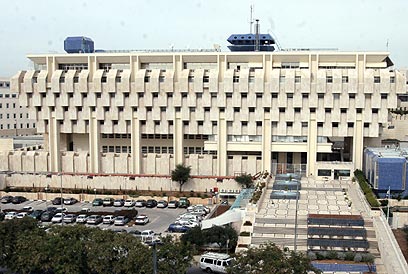
According to the report, the new government must cut NIS 13 billion ($3.5 billion) from the state budget in order to meet the expenditure ceiling rule approved in 2010. The central bank stresses, however, that a further increase in tax rates will be necessary as well.
According to the bank's estimates, the State's tax receipts in 2013 should be increased by NIS 6 billion ($1.6 billion) in order to meet the deficit target. Taking into account the effect of taxes on activity, tax rates will have to be increased, or tax exemptions reduced, by the equivalent of NIS 7.5 billion ($2 billion).
According to the bank's calculations, even if the next government completes a NIS 13 billion cut, the deficit – based on the bank's forecast growth of 3.8% – is still expected to be 3.6% of GDP, greater than the new deficit target of 3% of GDP adopted by the government in the summer of 2012.
Therefore, in order to meet the deficit target, the bank believes it will also be necessary to increase tax rates or to cancel tax exemptions.

Bank of Israel (Photo: Ata Awisat)
According to the bank, if the government fails to adjust its expenditures, the expected deficit in 2013 – based on the costs of the programs approved by the government and the tax rates set in law – will reach 4.9% of GDP compared to 4.2% in 2012.
"Without significant adjustment of the government budget – both a reduction in government commitments to increased expenditures, and higher tax receipts – the debt to GDP ratio is not expected to decline in the coming years, unless the growth rate is especially high – more than 5% per year, on average," the central bank says in its report.
The report includes a serious warning against the future faced by the Israeli economy if the budget cut is not implemented.
"If the government increases its expenditures in accordance with the cost of the programs it has approved… the debt to GDP ratio will approach 100% toward the end of the decade."
Israel's debt to GDP ratio currently stands at 74%, and approaching 100% could affect the government's ability to continue financing the budget deficit.
Biennial budget's negative effect
The Bank of Israel's Research Department analyzed the factors which led to the huge deficit recorded in 2012, NIS 39 billion ($10.5 billion). According to the analysis, most of the deviation from the deficit ceiling reflects tax receipts which were about NIS 14 billion ($3.8 billion) below projections when the budget was approved.
The balance reflects lower than projected non-tax revenues, for the second consecutive year, and expenditures in excess of the original budget, made possible by the transfer of unutilized balances from previous years' budget.
As for the low tax receipts, according to the bank there are two main reasons for that: Wages did not increased as projected by the Treasury economists, and the sale of new apartments was slower than expected.
"Most of the gap between actual tax receipts and the budget forecast derives from lower than expected growth of two macroeconomic variables – wages and new home sales," the bank's economists write in their review.
In addition, about a quarter of the deviation can be attributed to an overly optimistic forecast based on the available data when the budget was approved two years ago.
Bank economists say the two-year budget had a negative effect in this case, as it did not allow a readjustment of the budget in 2012 to the changed reality.
"Most of the gap was already identified during 2011, and, at the end of 2011, the government accordingly increased the forecast deficit to 3.4% of GDP. However, as it operated within the framework of a two-year budget, no adjustments were made at that time in order to reduce the deficit.
"It was only in the second half of 2012, as the deficit continued to grow, that the government decided to increase tax rates in order to reduce the deficit, primarily heading into 2013."
Solution: Cut fixed expenses
The report, which was only released now, has been sitting on Bank of Israel Governor Stanley Fischer's desk for more than a month. Its publication was postponed until after the Knesset elections, so that its grim content would not affect their results.
Alongside the recommendation for a significant tax hike, the report also includes a clear message to ministers, Knesset members and the Treasury's Budget Department.
According to the report, the deviation in the government's expenditures in 2013 is not a specific problem that can be solved by delaying one-time projects, like paving roads or laying railway tracks, to the following years.
At the moment, the gap between the expected cost of programs approved by the government and the expenditure ceiling stands at NIS 13 billion ($3.5 billion) for 2013, NIS 23 billion ($6.2 billion) for 2014 and NIS 28 billion ($7.6 billion) for 2015.
This means that if the government postpones one-time projects to the following years, it will be required to implement further and much higher cuts in 2014 and 2015.
The only solution for the budget deficit is cutting fixed expenses, such as salaries, pensions, ongoing projects (like free education from the age of three) and ministries' fixed budgets.















